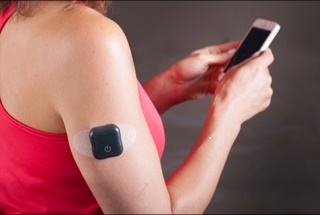Last week the medical device manufacturer Senseonics announced the CE Mark approval for their 90-day implantable glucose sensor system called Eversense. The CE Mark is a proof that the sensor system complies with relevant European directives, meets technical safety requirements and has shown clinical performance. The two Profil sites in Germany (Neuss and Mainz) participated in the pivotal clinical trial to generate the clinical data needed for CE Marking.

For an overview of the implantable CGM landscape and technical details on the Eversense CGM system, please check out this informative and entertaining video from last year. In brief, the Eversense system consists of three main components: (1) a small capsule-sized sensor that is implanted under the skin of the upper arm and measures glucose in the subcutaneous tissue via a fluorescence-based principle, (2) a body-worn smart transmitter that powers the sensor every 5 minutes to perform a measurement, processes the raw sensor signal, transmits sensor glucose value to a smart phone and vibrates to alert a patient, (3) a medical app on a smartphone displays the actual sensor glucose value and trend arrow, as well as much more information including glucose profiles, calibration values, hypo- and hyperglycaemic threshold ranges and alerts and alarms.
The PRECISE trial was performed to evaluate the performance (accuracy and longevity) of the Eversense system up to 180 days of continuous use. Seven investigational sites in the Netherlands, United Kingdom and Germany enrolled 72 patients with mainly type 1 diabetes. Roughly half of the trial participants were recruited and enrolled by Profil, providing us with many first-hand experiences of this innovative and novel continuous glucose sensor system. Data collected up to 90 days of sensor usage was analysed and submitted to a notified body for approval of the CE Mark. The 90-day results have recently been presented at diabetes technology conferences in Bethesda, MD and in Milan, Italy and presentation materials can be downloaded from the company’s website by clicking the following links (Primary results, User compliance, Safety analysis). The sensor accuracy is as good as some traditional CGM systems on the market, while it has the huge advantage of not having to undergo a sensor change on a weekly basis. The Eversense system performance was robust and reliable over the 90-day period.
The complete trial results will be presented at the annual ADA Meeting in New Orleans next month and may support future sensor usage for even longer than 3 months. At this conference also the user experiences will be shared, which will provide insights into how participants enjoyed the daily use of the sensor system. From my personal experiences as an investigator on the trial I can say that the participants I talked to where all very impressed by its ease of use, smartphone compatibility and alert capabilities and most patients ‘trusted’ the sensor readings within days after sensor insertion. I am sure most of our participants are looking forward to see the sensor on the market soon. With the CE Mark approval, Senseonics does indeed want to bring the system available for patients in Europe soon. According to the company’s press release distributors will launch the sensor in Sweden, Norway and Denmark within the next month, soon followed by distribution in the Netherlands and Germany.




